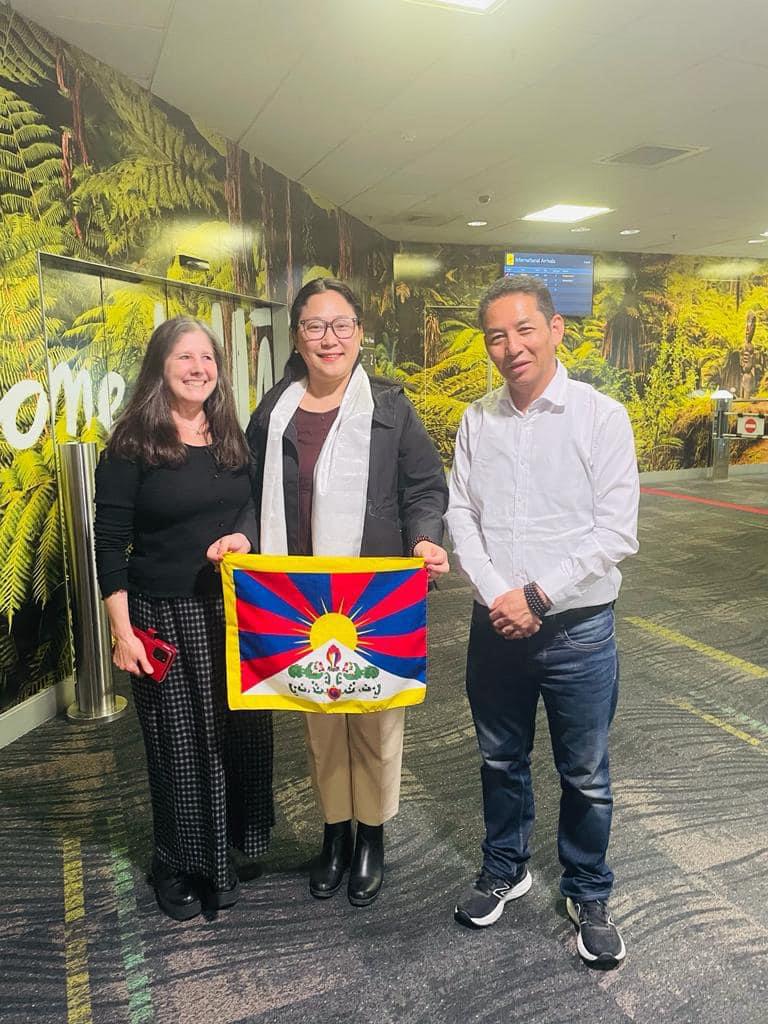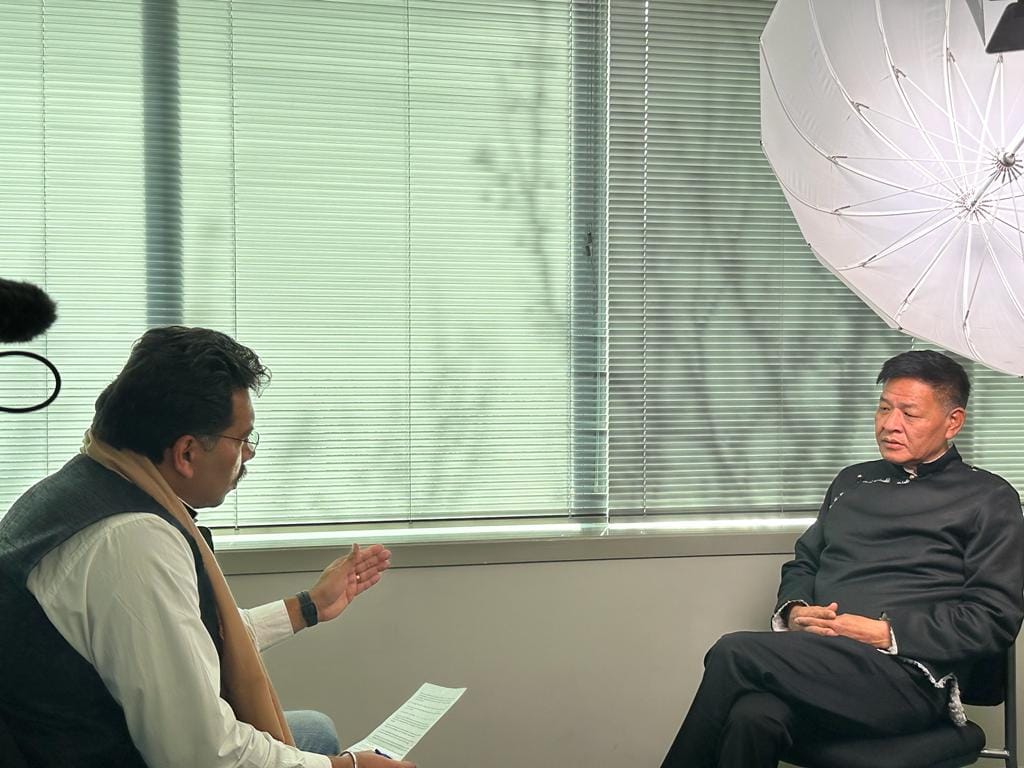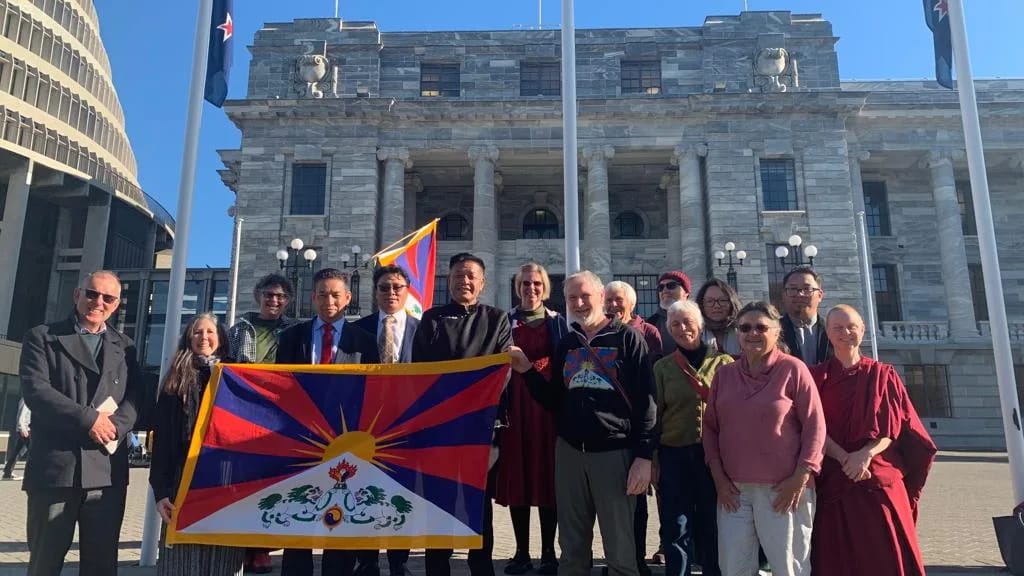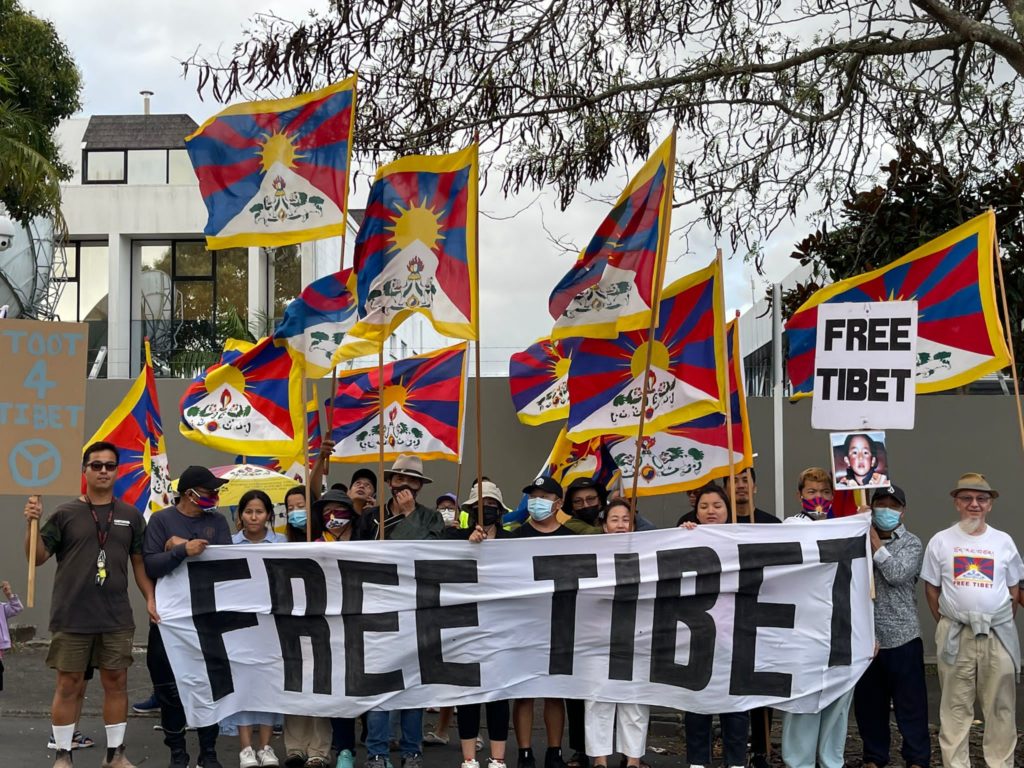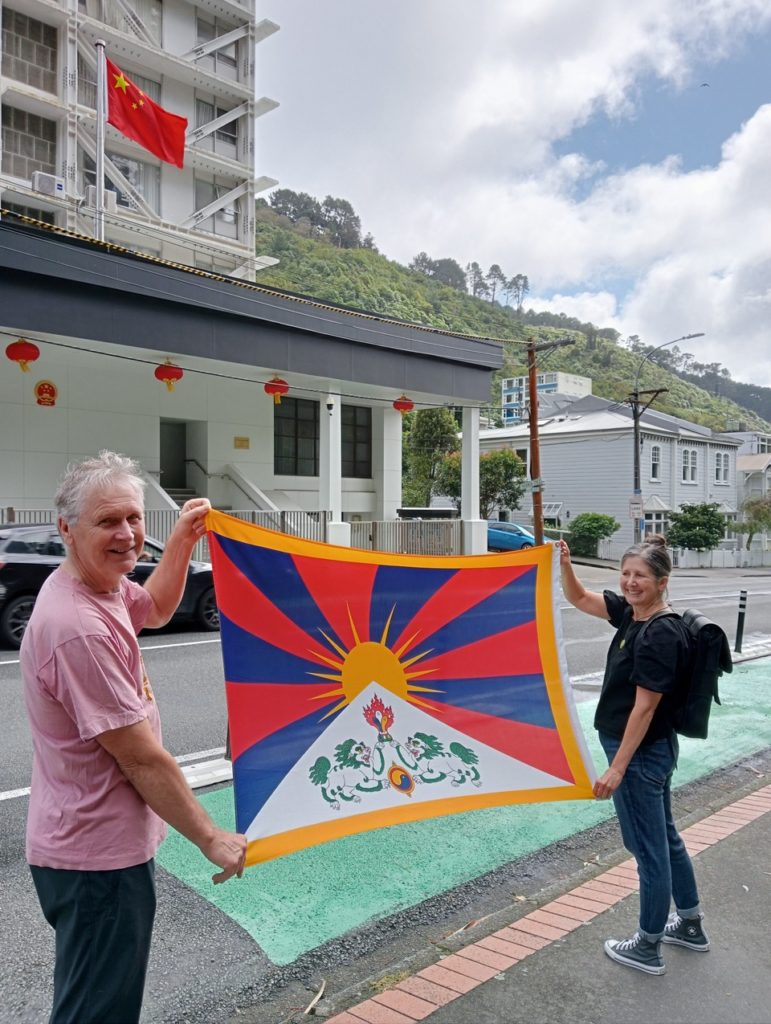TABLE OF CONTENTS
- High-level corruption cases in Tibet
- Tibet two sessions conclude
- Introduction of measures for cadres in the Tibet Autonomous Region
- Pushing Chinese as lingua franca in Tibet for ‘ethnic unity’
- Imprisonment of political prisoner emerges after 7 years
- Tibetan woman detained for social media video posts
- Consolidation of borders emphasized during Lhasa Guard District Party Committee meeting
- Chinese embassy hosts new year reception for Tibetans in Nepal
- Xi’s ‘12 musts’ directive for United Front work
- Party Secretary of Tibet Autonomous Region stresses Sinification of Tibetan Buddhism
- Tibetans forced to commemorate 130th anniversary of Mao Zedong’s birth
- Chamdo County-level temple management committee grassroots party-building meeting
- Widespread fire in Drayab likely caused by rocket debris
- Government-facilitated tourism: 843 Tibetans toured Nepal in 2023
- Transmission of electricity from Tibet to Chongqing in Southwest China
- Rural Work Conference in Lhasa
- Leaked document corroborates China’s concerning economic indicators
1. High-level corruption cases in Tibet
Tibetans in Tibet have long complained about corruption and rent-seeking by Chinese party and government officials. These complaints are not unfounded, as evidenced by the following corruption cases involving two former high-level government leaders.
Zhang Yongze, former vice-chairman of the government of the officially designated Tibet Autonomous Region (TAR), has been sentenced to 14 years in prison and fined 5 million yuan (US$ 703,000) by the Xi’an Intermediate People’s Court of Shaanxi province for accepting bribes totaling over 51.81 million yuan. The court also ordered the seizure of Zhang’s illicit funds and assets according to state media on Jan. 10, 2024. Zhang, 55, had spent most of his career in the TAR after he began work in 1997.
Zhang, who held various influential positions from 2003 to 2021, including head of the TAR’s Environmental Protection Department, was found guilty of abusing his position to facilitate projects and cadre appointments in exchange for bribes. He was also found guilty of misusing his position for sexual favors and other pleasures. Despite the severity of the charges, the court imposed a lenient penalty due to Zhang’s confession, disclosure of additional bribery facts, admission of guilt and return of ill-gotten gains. Zhang, 55, faced disciplinary action by China’s anti-graft bodies in January 2022 and was subsequently expelled from the party and removed from public posts in July 2022.
In another corruption case, Jiang Jie, former vice chairman of the Chinese People’s Political Consultative Conference (CPPCC) of the TAR, faced expulsion from the Communist Party of China and dismissal from public office after a case review by the Central Commission for Discipline Inspection and the State Supervision Commission. The investigation revealed serious violations, including engagement in corruption, power and sex transactions, according to state media. Jiang Jie’s actions, violating various disciplines and regulations, led to the termination of his party membership, dismissal from public office and termination as a delegate to the 10th Communist Party of China TAR regional congress, as well as the confiscation of his illegal gains. The case has been referred to the procuratorate for review and prosecution.
2. Tibet two sessions conclude
The recent conclusion of the two sessions of the Tibet Autonomous Region in Lhasa, comprising the political consultative conference and the people’s congress on Jan. 9 and 10 respectively, did not bring forth any significant announcements beyond routine proceedings.
During the closing ceremony, Wang Junzheng, the party secretary of the Tibet Autonomous Region, underscored the primary goals of the two sessions. These involved supporting the “two establishments”—establishing Xi Jinping as the core of the entire party and solidifying the role of Xi Jinping Thought on Socialism with Chinese Characteristics for the New Era, as outlined in the party’s historical resolution. Additionally, the sessions aimed to uphold the “two safeguards”—ensuring Xi’s core status within the CCP and preserving the central authority of the party.
Wang summarized the party’s policies in Tibet, emphasizing the focus on “cultivating a strong sense of the Chinese nation’s community, engaging in profound anti-separatist efforts, fostering high-quality economic development, intensifying ecological and environmental protection, implementing measures to rejuvenate borders and improve people’s livelihoods, and enhancing the modernization of grassroots social governance.” He reiterated the commitment to adhering to General Secretary Xi Jinping’s crucial directives on Tibet work and the party’s governing strategy for Tibet in the new era.
3. Introduction of measures for cadres in the Tibet Autonomous Region
The Tibet Autonomous Region recently introduced the “Measures for Enhancing the Performance of Cadres in the Tibet Autonomous Region (Trial),” a guiding document suggesting the reinforcement of cadre assessment methods. This includes dealing seriously with cadres who are “Buddhist,” those in a “flat state” and those with unsatisfactory work. The issuance of these “Measures” follows the nationwide release of the “Outline of the Party and Government Leadership Building Plan.”
The document highlights Tibet’s efforts in promoting the “four major events” of stability, development, ecology and strong borders. The objective is to establish the region as a national model for unity and progress, a pioneering area for high-quality plateau economic development, a national ecological civilization highland and a nationally secure border area. The “Measures” act as a guiding principle for cadre selection, emphasizing strict adherence to the cadre’s political commitment and evaluation systems. They also advocate for the simplification of files on the political quality of party members and cadres, with the exclusion of those deemed politically unfit.
4. Pushing Chinese as lingua franca in Tibet for ‘ethnic unity’
In 2023, the Nyemo County Party Committee in Lhasa City implemented three measures focusing on “point and aspect, quantity and quality, and practicality and effectiveness” to deepen the spread and usage of the Chinese language in Tibet, implementing the policy to spread Chinese under the theme of “national common language education and training.”
As part of its diverse strategies, the committee had sent batches of village leaders for intensive training outside the region to promote Chinese language. Additionally, it guided various departments, including the United Front, education, and other industries, to send CPPCC members, teachers and students from different backgrounds to Beijing, Hebei and other locations for study tours, according to the United Front Work Department of CCP Central Committee on Dec. 27, 2023, summarizing activities in 2023 in the implementation of promotion of the “national common language.”
The city’s village cadres underwent Chinese language training under the “Language Training Plan” and received completion certificates from the TAR Mandarin Promotion Base. Mobile party schools were conducted in agricultural and pastoral areas, reaching over 15,000 cadres and the general population. Hundreds of farmers and herdsmen were taught the Chinese language through the method of “daily paired learning, weekly individual self-study and monthly intensive training.”
To facilitate communication, cadres and party members are required to install the “Tibetan Translator” software, with a high usage rate of 96.8%. This effort aimed to break down communication barriers between cadres and the public and strengthen the “sense of community of the Chinese nation.”
In recognition of their efforts, Nyemo County was given accolades in 2022 as a model collective for “ethnic unity and progress” at the district and city levels. In 2023, it was further recommended as a national-level model county for ethnic unity and progress.
5. Imprisonment of political prisoner emerges after 7 years
Recent information has emerged regarding the imprisonment of Lhakdor, a Tibetan resident of Palyul (Chinese: Baiyu) County in the Kardze Tibetan Autonomous Prefecture. In 2016, he was reportedly sentenced to 11 years in prison for allegedly possessing Tibetan independence-related media on his phone, according to the exile media outlet Tibet Times’ report on Dec. 29, 2023. During a trip from Kardze to Lhasa in July 2016, he was detained by the police after they examined his phone and accused him of spreading rumors. Lhakdor’s family was present when the Palyul County People’s Court issued the sentence. Despite being described as a patriotic Tibetan involved in small businesses and regular travel, he has been allowed only one family visit in the seven years since his imprisonment. Requests for additional visits have been consistently denied on various grounds.
6. Tibetan woman detained for social media video posts
Tsering Tso, a 39-year-old from Trika (Guide), Tsolo (Hianan) Tibetan Autonomous Prefecture, Qinghai, was arbitrarily detained on December 25, 2023, on charges of “picking quarrels and provoking troubles” after she posted three video clips on social media a few days earlier criticizing a police checkpoint in Drachen (Baqing) County in Nagchu City, TAR, as a violation of her right to privacy.
In one of the videos from Dec. 19, Tsering Tso expressed frustration with the police checkpoint’s intrusion into her privacy during her journey from Yushu to Lhasa. She argued that her purpose for traveling to Lhasa was her private matter, and she emphasized her understanding of the law, asserting her right to privacy. According to Tibet Watch’s translation of one video clip, Tsering says, “Take a look at this [Drachen County] police checkpoint. I came from Yushu to go to Lhasa. They [police] asked what I was going to do there. I told what I was going to do was my right to privacy. What right do you [police] have to know? They consistently infringe on our privacy as if we have no right to privacy. He [the police] also said that the other people have no problem [with the questions]. It is their business that they don’t understand the law. I understand the law. I want to make clear that going to Lhasa is my work.”
This recent detention follows her 15-day administrative detention in Yushu City from Oct. 26 to Nov. 10, 2023, for posting 17 critical comments from Oct. 8 to 25, 2023 on Douyin, the Chinese TikTok, criticizing the government and its staff.
7. Consolidation of borders emphasized during Lhasa Guard District Party Committee meeting
The 16th plenary (enlarged) meeting of the 6th Lhasa Guard District Party Committee, an administrative body overseeing the military and political affairs within Lhasa Guard District, was held from Jan. 25 to 26. Xiao Youcai, holding the concurrent titles of member of the Standing Committee of the TAR Party Committee, secretary of the Lhasa Municipal Party Committee and first secretary of the Lhasa Guard District Party Committee, in his speech emphasized implementation of Xi Jinping’s directives on strengthening the military and the party’s strategy for “governing Tibet in the new era.” According to a state media report, he underscored the need to consolidate borders, stabilize Tibet, and ensure long-term peace and stability for Lhasa while promoting “high-quality development.” Emphasis was also made on building an army through politics, training troops for war readiness and fostering military-civilian coordination.
8. Chinese embassy hosts new year reception for Tibetans in Nepal
The Chinese Embassy in Nepal hosted a Tibetan Wood Dragon New Year reception in Kathmandu on Jan. 28, attended by Ambassador Chen Song and Wang Li from the “China Tibetan Culture Protection and Development Association.” The event was attended by nearly 1,000 Tibetan residents of Nepal. Ambassador Chen highlighted China’s economic progress under the party’s leadership and its active global engagement. He called for Tibetans in Nepal to “participate in the construction of their hometown, safeguard national unity and ethnic unity, continue to serve as bridges and links, and contribute their share to comprehensively promoting the great rejuvenation of the Chinese nation through Chinese-style modernization,” according to a state media report. In the recent past, there has been an uptick in the Chinese government’s efforts in propagating propaganda and outreach to the Tibetan diaspora community in line with the CCP’s United Front strategy.
9. Xi’s ‘12 musts’ directive for United Front work
The second issue of “Qiushi” magazine published on Jan. 16 carried Xi Jinping’s article on United Front work. The article outlines 12 imperative guidelines derived from his speech at the Central United Front Work Conference on July 29, 2022. These directives underscore the critical role of the United Front as a strategic tool for achieving the party’s governance goals. Key points include emphasizing people’s support and collective strength, maintaining a “balance between unity and diversity,” advancing China’s political party system, fostering a sense of community among ethnic groups, promoting religious development in line with Chinese characteristics, engaging non-Communist Party intellectuals and individuals from new social strata, supporting the non-public sector’s economic growth, strengthening ties with Hong Kong, Macao, Taiwan and overseas Chinese communities, cultivating non-CCP representative figures, understanding the laws governing United Front work and ensuring the party’s overarching leadership in this endeavor. These guidelines serve as a comprehensive framework to guide and consolidate the party’s United Front efforts across diverse sectors and regions.
The “12 musts” as stated in the article are:
- must give full play to the role of the United Front as an important means
- must secure support of the people and pool strength for our cause
- must strike the right balance between commonality and diversity
- must uphold, develop and improve China’s new model of political party system
- must make fostering a strong sense of community for the Chinese nation the main task in the Party’s work related to ethnic affairs
- must develop religions in the Chinese context
- must foster close bonds with non-CPC intellectuals and personages from new social strata
- must facilitate the healthy growth of the non-public sector of the economy and encourage those working in this sector to achieve success
- must exert the role of united front work to win hearts and minds of people in Hong Kong, Macao and Taiwan as well as overseas Chinese
- must strengthen the ranks of non-CPC representative figures
- must grasp the laws governing united front work
- must enhance the Party’s overall leadership over united front work
RELIGION
10. Party Secretary of Tibet Autonomous Region stresses Sinification of Tibetan Buddhism
On Jan. 5, a symposium with representatives of monastic communities was conducted in Lhasa, according to state media on Jan. 6, 2024. Wang Junzheng, the secretary of the Party Committee of the Tibet Autonomous Region, emphasized the necessity of fully implementing the party’s strategy for governing Tibet and its religious work guidelines in the “new era.” The focus was on guiding Tibetan Buddhism to adapt to socialist society and actively promoting its Sinification. He emphasized the importance of adhering to the “two safeguards” and understanding the “two establishments” by the monastic community. He also highlighted the achievements of “Three Consciousnesses” education and urged consistent implementation, innovation and clear communication to unite religious circles closely under the party and the Central Committee.
Yan Jinhai, chairman of the government of the Tibet Autonomous Region, in his speech discussed the enhanced awareness among monks and nuns regarding the state’s supremacy over religion and the importance of citizenship and rule of law. Yan stressed that all levels and departments should align with the objective of Sinifying Tibetan Buddhism, handle religious affairs in compliance with the law, enhance and introduce innovations in temple management, and more effectively utilize the positive influence of Tibetan Buddhism in fostering social development and stability.
11. Tibetans forced to commemorate 130th anniversary of Mao Zedong’s birth
To commemorate the 130th anniversary of Mao Zedong’s birth, the Advanced Buddhist College in Beijing organized a “national common language recitation competition” on Dec. 22, 2023, with the theme “Commemorating the 130th Anniversary of Chairman Mao’s Birth.” According to a report on the website of the United Front Work Department of the Communist Party of China Central Committee on Dec. 28, 2023, 22 Tibetan Buddhist monks at the college were compelled to participate in the competition to “express deep memories of Chairman Mao and boundless affection for the motherland.”
At the event, Wang Zhigang, secretary of the Party Committee of the Academy, stressed the importance of ideological consistency with the Party Central Committee led by Xi Jinping. He instructed the Tibetan monks to strengthen their Chinese language skills, enhance their “five identities” and foster a “strong sense of the Chinese nation’s community.”
According to Radio Free Asia, Chinese authorities in Tibet forced Tibetans to celebrate the 130th anniversary of Mao’s birth on Dec. 26 by crediting Mao with the “peaceful liberation of Tibet” in 1950. A young Tibetan in Lhasa told RFA that officials used Mao’s birthday “to spread false information and distort facts about Tibet’s past history, in the hope of making the Tibetan people believe this disinformation.”
12. Chamdo County-level temple management committee grassroots party-building meeting
The 2023 grassroots party-building work report review meeting of the party secretary of the county-level Temple Management Committee of Chamdo (Changdu) City was convened via video conference on Jan. 25, according to the Chamdo United Front via state media. Representatives from various departments, including the Municipal Religious Affairs Bureau and the Municipal Buddhist Association, participated in the meeting alongside county-level cadres and temple management committee officials. During the meeting, 11 party group secretaries of the county-level temple management committees presented on-site work reports, which were evaluated on the spot, while the remaining secretaries submitted written reports. The meeting emphasized the strengthening of political construction within each temple management committee, focusing on understanding the significance of the “two establishments” (Xi Jinping stands as the undisputed core leader of the Chinese Communist Party, and Xi Jinping’s principles serve as the foundation for the future) and enhancing ideological awareness to forge a strong sense of the Chinese nation’s community and the Sinification of Tibetan Buddhism. Additionally, it called for adherence to legal regulations in religious affairs management and the Sinification of Tibetan Buddhism, alongside efforts to improve party-building work and standardize party organization construction within temple management committees.
DEVELOPMENT
13. Widespread fire in Drayab likely caused by rocket debris
A significant fire that broke out in the Drayab region of Kham, Tibet, is believed to have resulted from a rocket booster crash. Videos shared on social media depict intense flames, possibly caused by a rocket booster blast on Dec. 26. The incident in Drayab, within the traditional Tibetan province of Kham, occurred without a prior evacuation notice, unlike the precautionary announcement for seven townships in China’s Guangxi Autonomous Region. The video shows a damaged section, likely from a rocket booster, crashing in a hilly area, causing widespread fires. The incident is suspected to be linked to China’s Long March 3B rocket launch on the same day. Despite the lack of confirmation, the timing and location suggest a connection between the booster crash and the rocket launch from the Xichang Satellite Launch Center in Southwest China’s Sichuan Province.
14. Government-facilitated tourism: 843 Tibetans toured Nepal in 2023
The Tourism Development Department of the Tibet Autonomous Region disclosed that the department facilitated 23 tour groups in 2023 comprising 843 individuals to travel to Nepal, including 41 tour guides and staff, according to a Chinese state media report on Dec. 26, 2023. Although the notice for outbound tourism was issued in January 2023, the first Tibet outbound tourism group embarked on its journey from Kyidong (Gyirong) port to Nepal on July 29.
Wang Xiaodong emphasized that the Tibet Autonomous Region Tourism Development Department will continue to foster both inbound and outbound tourism. They aim to enhance the promotion of overseas tourism, organize groups for exchanges with countries like Russia, Belarus, Singapore, Malaysia and Thailand.
15. Transmission of electricity from Tibet to Chongqing in Southwest China
On Dec. 22, 2023, Chongqing Electric Power Trading Center Co., Ltd. announced the transmission of 2.768 million kilowatt-hours of power from Tibet to Chongqing, a major city in Southwest China, for the first time, according to state media. Per the state media report, this transmission is expected to pave the way for substantial consumption of Tibetan electricity in Chongqing in the future.
16. Rural Work Conference in Lhasa
On Jan. 24, the Rural Work Conference of the Tibet Autonomous Region Party Committee took place in Lhasa. Wang Junzheng, party secretary of the TAR, instructed studying and implementing General Secretary Xi Jinping’s directives on the “three rural” work (agriculture, rural areas and farmers) for the “revitalization of the countryside.” Wang emphasized the need to thoroughly implement the instructions of the Central Rural Work Conference held in December 2023. The CCP aims to industrialize Tibet’s rural areas in the name of ensuring food security, increasing farmers’ and herdsmen’s incomes, and enhancing rural infrastructure. Measures toward this goal included promoting agricultural modernization, supporting employment transfers and developing “characteristic agriculture,” according to the report by state media. Wang emphasized the party’s leadership in rural affairs and instructed effective implementation of policies. The meeting, conducted via video and telephone conference, was attended by provincial leaders, military region officials and members from relevant party committees and the government.
17. Leaked document corroborates China’s concerning economic indicators
A leaked document of the Central Office of the Central Committee of the Communist Party of China’s Central Committee on Learning and Implementing Xi Jinping’s Socialism with Chinese Characteristics for a New Era dated Jan. 9, 2024, provides instructions for implementing frugality by party and government organs down to the county level across China. The five-page document titled “Notice on Conscientiously Implementing the Spirit of General Secretary Xi Jinping’s Instructions and Promoting Party and Government Organs to Get Accustomed to Tightening Life” carries three points for implementing austerity measures considering concerning economic conditions in China. The leaked document corroborates analysts’ conclusion on China’s concerning economic indicators.

